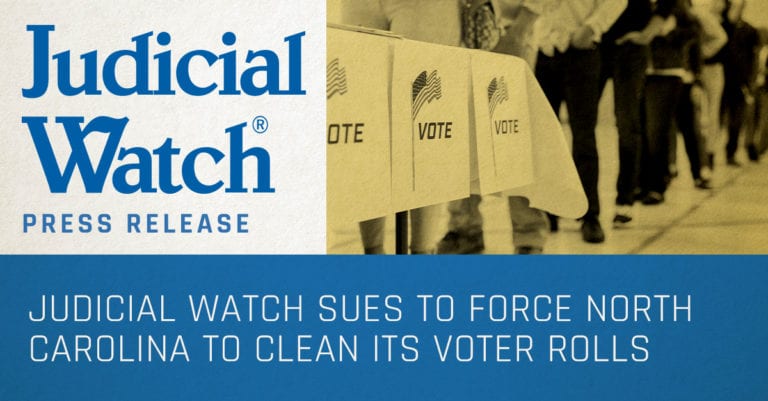
Judicial Watch Sues to Force North Carolina to Clean Its Voter Rolls

Lawsuit Alleges North Carolina has Nearly One Million Inactive Voters
(Washington, DC) – Judicial Watch announced today that it filed a lawsuit against North Carolina and two of its counties for failing to clean their voter rolls. According to Judicial Watch’s analysis of voter registration data, many of North Carolina’s 100 counties have large numbers of ineligible voters on their rolls. Judicial Watch also alleges that the States’ own data shows that North Carolina has nearly one million inactive voters on its rolls (Judicial Watch v. North Carolina and North Carolina State Board of Elections, et al. (No. 3:20-cv- 211)).
Judicial Watch’s lawsuit argues that North Carolina, Mecklenburg County, and Guilford County failed to make reasonable efforts to remove ineligible voters from their registration rolls as required by the federal National Voter Registration Act of 1993 (NVRA). The lawsuit also claims that these jurisdictions violated the NVRA by failing to make available to Judicial Watch public records concerning efforts to comply with the law.
The NVRA provides for the removal of the names of registrants who have failed to respond to an address confirmation notice and then failed to vote in the next two general federal elections. Federal law makes these removals mandatory.
In June 2019, the U.S. Election Assistance Commission (EAC) released data showing that voter registration rates in a significant proportion of North Carolina’s 100 counties are close to, at or above 100% of their age-eligible citizenry – statistics considered by the courts to be a strong indication that a jurisdiction is not taking the steps required by law to remove ineligible registrants. Judicial Watch’s analysis also showed that at the time of the EAC report the entire State of North Carolina had a registration rate close to 100% of its age-eligible citizenry.
In its complaint Judicial Watch also points out that the State’s abnormally high number of inactive registrations shows that it is not removing these registrations after two general federal elections, as the NVRA requires. According to data the State certified to the EAC in 2019:
- About 17% of North Carolina’s registrations were inactive, which was the fifth worst (highest) of the 40 states for which data were available
- By way of comparison, the median state inactive rate was 9.6%
- In 19 North Carolina counties, 20% or more of the registrations were inactive, and in three counties 25% or more were inactive
North Carolina’s inactive registrations remain high to this day. The complaint notes:
- As of March 2020, North Carolina’s own data shows it has nearly one million inactive registrations
- A large proportion of these registrations have shown no voting activity for more than five years – that is, since prior to November 2014
“Dirty voting rolls can mean dirty elections, and Judicial Watch must insist that North Carolina follows federal law to clean up its voting rolls,” said Judicial Watch President Tom Fitton. “We want cleaner elections, as the law requires, and we expect this lawsuit will cause North Carolina to take the simple steps necessary to clean from its rolls the names of voters who have moved away or died.”
Judicial Watch is the national leader in enforcing the NVRA. In December 2019, Judicial Watch provided notice to 19 large counties in five states that it intended to sue unless they take steps to comply with the NVRA by removing ineligible registrations from their rolls. In addition to North Carolina, Judicial Watch sent letters to counties in California, Pennsylvania, Virginia and Colorado.
In 2018, the Supreme Court upheld a voter-roll cleanup program that resulted from a Judicial Watch settlement of a federal lawsuit with Ohio. California settled an NVRA lawsuit with Judicial Watch and last year began the process of removing up to 1.6 million inactive names from Los Angeles County’s voter rolls. Kentucky also began a cleanup of hundreds of thousands of old registrations last year after it entered into a consent decree to end another Judicial Watch lawsuit.
Despite successful litigation by Judicial Watch to bring counties and states into compliance with the NVRA, voter registration lists across the country remain significantly out of date. Judicial Watch’s 2019 study found 378 counties nationwide that had more voter registrations than citizens old enough to vote, i.e., counties where registration rates exceed 100%. These 378 counties combined had about 2.5 million registrations over the 100%-registered mark. This is a drop of about one million from Judicial Watch’s previous analysis of voter registration data in 2017.
Judicial Watch Attorney Robert Popper is the director of Judicial Watch’s Election Integrity initiative. Judicial Watch is being assisted by Mark A. Jones of Bell, Davis & Pitt in Charlotte, North Carolina; and by H. Christopher Coates of the Law Office of H. Christopher Coates.
###
















